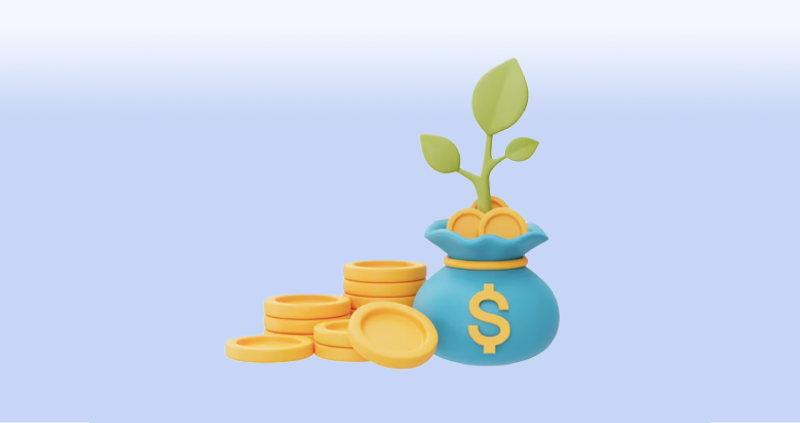How to invest $20K
$20K investment ideas based on your personal circumstances.
How your current financial position can impact investment decisions: Factors such as existing debt or regular payments should be taken into consideration before putting your money into an investment account.
The best ways to invest $20K: While there is no single best way to invest, you can consider focusing on your savings goals when thinking about where to invest.
Investment options for long-term goals: Contributing to options such as savings accounts, retirement accounts, and brokerage accounts can help you reach long-term investment goals.
Understand your current financial situation
Investing can be a great way to make your savings work harder for you, but depending on your personal circumstances, there can be some ways to invest that work better than others. You might want to consider if investing is the right option for you if you have surplus funds in your account.
It’s a long game, one that might only really pay off if you can afford to let your money grow over a number of years. If you think you will need that money in the near future, you might want to carefully consider your investing options, as some investment accounts may charge you for early withdrawals. You can also miss out on certain benefits by taking your money out before an investment account reaches maturity.
If you currently have any outstanding debt, overdrafts, or have regular monthly payments due that will use up the money you were planning to invest with, you might want to rethink where to invest your money.
No matter whether you’re a seasoned investor or if you are new to the investment market, understanding where to invest and the risks associated can help you build your portfolio in a smarter, more effective way. If you’ve got a spare $20K to invest, here are just some options you can consider.
If you’re in any doubt about whether investing is right for you, you might want to speak to a financial advisor before making any major decisions.
The best ways to invest $20K
It’s worth noting that there is no one ‘best’ way to invest $20K. The option you choose will depend on your own situation, as well as how the market is performing at the time. However, there are some commonly used investment strategies out there that might be beneficial.
Index funds
One of these strategies includes index funds. Index funds are a type of investment fund (oftentimes a mutual fund or exchange-traded fund (ETF)) that aims to mirror the performance of a specific market index. While there are many types of index funds you can invest in, it is important to do your research first and understand any associated risks. This investment option is known for historically offering returns, but this is no guarantee of positive returns in the future.
Exchange-traded funds (ETFs)
Investing in exchange-traded funds (ETFs) is generally considered a less risky investment approach, as your money is spread over numerous stocks and shares. Once your portfolio is up and running, and you’ve gathered more experience, you could consider investing in individual stocks. These do pose a higher risk — as you’re effectively putting more eggs in the same basket — but they can potentially offer high rewards. However, it is important to consider your risk tolerance and the possibility of losses when it comes to these types of investments.
Build your investment strategy
Another option is to gradually build up your investment strategy over time. So instead of trying to predict how the market will perform or tracking the market 24/7, you can commit to investing a set amount of money on a regular basis.
This will help you spread the risk of your investment, meaning you benefit if markets are doing well, and potentially risk losing less during market downturns. You can always rebalance your portfolio to help you mitigate losses, or if you simply want to change your strategy.
Consistency is key. Investing isn’t a quick-win plan, but over time, it has the potential to generate returns.
Where else could you invest $20K?
Investment ETFs and index funds aren’t your only options when it comes to making the most of your $20,000. In fact, you could also consider how to make more money in the long run with the following strategies:
Pay off any debt
Debt adds up, and the interest you owe on it could easily outweigh the potential benefits of any investment. Consider using any spare cash to pay off your debt and save yourself money every month. You can also establish a savings plan while paying off your debt.
Invest in real estate investment trusts
Real estate investment trusts, REITs, are a type of investment vehicle allowing individual investors to participate in real estate investing without directly owning and managing property. REITS can be a good way to diversify your portfolio and generate income. However, while REITs are also a common investment method for good returns, it is still important to understand the associated risks with this type of investment, as returns are not guaranteed.
Open a savings account
When comparing saving vs. investing, savings accounts generally carry lower risk. They pay you an interest rate influenced by the overall economy, rather than specific businesses or products. While these interest rates can fluctuate with inflation, you won't have to deal with the same volatility the stock market offers. The main downside is that inflation can erode the value of the interest you earn.
Furthermore, if you think you will need your money sooner rather than later, you might be better off with putting it into a savings account, where your money can be more easily accessible. Options like high-yield savings accounts give you higher interest rates than traditional savings accounts, allowing you to make the most of your money. Most options also give you access to your funds as needed, offering you greater flexibility.
The Raisin marketplace gives you access to various high-yield savings products with competitive interest rates, so you can make the most of your savings. Explore accounts and start multiplying your funds today!
Put it into a retirement account
Saving for your retirement can take the stress out of finances once you stop working. Having this money set aside can help you maintain a standard of living, and reap the rewards of a life of hard work. It could even help you afford that thing you’ve always dreamt of, such as retiring in the sun or going on that perfect vacation. You might want to consider speaking to a retirement financial advisor to see what your best options would be.
Open a brokerage account
Unlike traditional investment accounts, a brokerage account will have someone else making and managing the investments for you. This person (the broker) will take a percentage of your investment as payment, and will decide where to put your money based on market performance and your goals.
How to decide which investment option is best for you
The best option is the one that matches your current situation and helps you reach your goals. You might want to first do your research, see what the market has to offer, and what your personal situation allows you to do.
Some investment accounts might be performing better than others right now, or you might have specific businesses in mind to put your money into. You should also think about what your long-term goals are for your investment: do you plan to keep it saved away for years to come, or do you have a set date in mind? If you do, consider investments that will mature sooner.
Explore high-interest savings accounts with Raisin
If you want to see your money do more, a high-interest savings account can be a simple way to help it grow. You might also consider adding a high-yield savings account or certificate of deposit to your portfolio to help grow your $20K. Compare competitive rates at the Raisin marketplace and get started today!
The above article is intended to provide generalized financial information designed to educate a broad segment of the public; it does not give personalized tax, investment, legal, or other business and professional advice. Before taking any action, you should always seek the assistance of a professional who knows your particular situation for advice on taxes, your investments, the law, or any other business and professional matters that affect you and/or your business.


